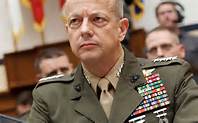Gen. John Allen carries a heavy rucksack in the fight against the Islamic State
By David Ignatius /December 11 /The Washington Post
Gen. John Allen must sometimes feel as if he’s navigating a maze as he organizes the coalition to defeat the Islamic State: Iran is a silent partner in Iraq but a potential adversary in Syria and elsewhere; Turkey and Saudi Arabia are crucial allies but skittish and self-interested ones; the very map of battle is uncertain, as boundaries in the region begin to blur.
When Allen took the job in September, Islamic State fighters had overrun much of Iraq and Syria, and President Obama was worried that Jordan and Saudi Arabia might be next. Allen’s appointment signaled a policy decision by Obama but not yet a strategy. It could be said of Allen’s effort, as Rick Atkinson wrote in “An Army at Dawn” of Allied forces in North Africa in 1942: “Only seers or purblind optimists could guess that these portents foreshadowed victory.”
David Ignatius writes a twice-a-week foreign affairs column and contributes to the PostPartisan blog. View Archive
Facebook
RSS
Victory is hard to define in this campaign, let alone accomplish. But three months into his job, Allen has at least set the order of battle in the Iraq theater of this multifront campaign.
A broad coalition against the Islamic State has been formed, and its members are flying combat missions and preparing joint information operations; Iraq’s polarizing prime minister has been replaced by a more conciliatory one; an Iraqi army that had collapsed is being rebuilt in regional pieces. The Islamic State’s expansion has been halted, and its members now fear to travel in convoys; when the extremists fought an open battle at Kobane in Syria, they lost an estimated 1,000 fighters.
But the fundamental contradictions of Obama’s policy remain. Allen, a former commander of coalition forces in Afghanistan and one of the architects of the “Sunni Awakening” in Iraq, was a good choice for this evolving, ad hoc effort. But he’s carrying a heavy rucksack, as Gen. David Petraeus liked to say, that contains pieces of a strategy that don’t yet fit together.
The most perplexing problem is Syria, where the coalition members have different agendas. Saudi Arabia, Turkey and Qatar demand the ouster of President Bashar al-Assad. But Jordan and the United Arab Emirates are wary of decapitating the Syrian regime before a transition is ready. Then there is Iran, whose Hezbollah proxy force is the main reason Assad survives.
What’s more, the coalition doesn’t now have a credible means of defeating the extremists in Syria. The Free Syrian Army remains a talking point rather than a real force. The CIA has trained covert groups that operate effectively in southern Syria, where Jordanian intelligence can dole out money and weapons, but are disorganized in northern Syria, where operatives backed by Turkey, Qatar and Saudi Arabia jockey for power.
Given the Syria conundrum, Obama favors an Iraq-first strategy. But this empowers Iran, whose fighters could threaten the thousands of U.S. military advisers streaming into Iraq. One administration official explains: “You’ve got a significant number of U.S. personnel in Iraq. Do you want to take on Iran in Syria and scramble that picture? We’re mindful of that.”
Syria may be a version of what economists call an “impossibility theorem,” in which there’s no good way of ordering conflicting preferences. The moderate opposition doesn’t exist; a strategy to oust Assad may imperil U.S. forces in Iraq; if Assad remains he will be a magnet for extremists; encouraging Turkish troops to help create a “safe zone” may give them lasting control of northern Syria. It’s a lose-lose situation.
When there’s no evident solution inside the box, it’s time to look outside, and that’s what Obama administration policymakers are beginning to do on Syria. They’re exploring a local cease-fire that would freeze combatants in Aleppo and discussing new formulas for political transition.
Secretary of State John Kerry explains in an interview: “There’s room for a lot of creative effort in diplomacy right now. And we’ve talked with the Russians and with others about ways to preserve the institutions of the [Syrian] state, get to a legitimate negotiation and transition, and try to end the violence.”
Another intriguing development is the planned dialogue in Lebanon between the Saudi-backed Sunni leadership and Iranian-backed Hezbollah. Nader Hariri, the Sunni representative, received a glowing profile recently in the pro-Hezbollah Beirut newspaper Al Akhbar.
A U.S. intelligence official notes: “Hezbollah through various means is signaling its interest in dialogue with key members of the Sunni community in Lebanon.” Is this a path to a broader dialogue about reducing sectarian tensions and perhaps a common front against the Islamic State? “That’s probably a long way off,” cautions the intelligence official. But it’s worth watching.
Read more from David Ignatius’s archive, follow him on Twitter or subscribe to his updates on Facebook.





















